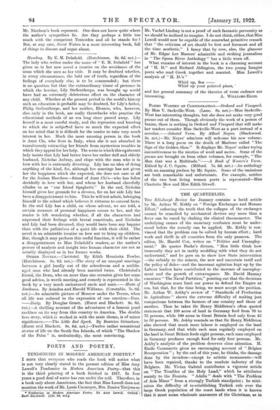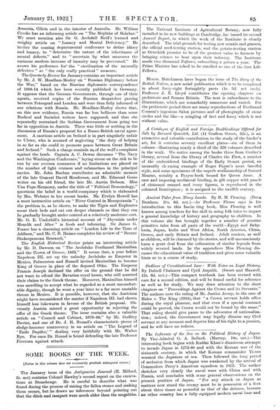THE QUARTERLIES.
Dm Edinburgh Review for January contains a lucid article by Mr. Arthur W. Kiddy on " Foreign Exchanges and Human Effort," enforcing the truth that the collapse of the exchanges cannot be remedied by mechanical devices any more than a fever can be cured by shaking the clinical thermometer. The underlying causes of the monetary confusion must be under- stood before the remedy can be applied. Mr. Kiddy is con- vinced that the problem can be solved by human- effort ; hard work and thrift in all countries form the only panacea. The editor, Mr. Harold Cox, writes on " Politics and Unemploy- ment." He quotes Burke's dictum, " Men little think how immorally they act in rashly meddling with what they 'do not understand," and he goes on to show how State intervention —the subsidy to the miners, the new and uncertain tariff and the policy of doles—and the incessant agitation kept up by the Labour leaders have contributed to the increase of unemploy- ment and the growth of extravagance. Mr. David Hannay examines " The Naval Partition," pointing out that the decisions of Washington must limit our power to defend the Empire at sea, but that, for the time being, we must accept the position. Mr. Arthur W. Ashby's review of " Standards of Production in Agriculture " shows the extreme difficulty of making just comparisons between the farmers of one country and those of another. Thus he takes Sir Henry Middleton's often quoted statement- that 100 acres of land in Germany feed from 70 to 75 persons, while 100 acres in Great Britain feed only from 45 to 50 persons. Mr. Ashby reminds us that Sir Henry Middleton also showed that much more labour is employed on the land in Germany, and that while each man regularly employed on the land in Great Britain feeds eight persons, each man employed in Germany produces enough food for only four persons. Mr. Ashby's analysis of the problem deserves close attention. M. Emile Cammaerts gives an encouraging account of " Belgian Recuperation " ; by the end of this year, he thinks, the damage done by the invaders—except to artistic monuments—will have been repaired, thanks to the resolute industry of the Belgians. Mr. Vivian Gabriel contributes a vigorous article on " The Troubles of the Holy Land," which he attributes mainly to the Zionists. " Adalia " deals with " The Problem • of Asia Minor" from a strongly Turkish standpoint ; he mini- mizes the difficulty of re-establishing Turkish rule over the large Greek population of the coast lands when it is known that it must mean wholesale massacres of the Christians, as in
Armenia, Ci!leis and in the interior of Anatolia. Mr. William Crooke has an informing article on " The Moplahs of Malabar."
We must mention also Sir G. Archdall Reid's learned and weighty article on " Lunacy and Mental Deficiency." He invites the coming departmental conference to define idiocy and lunacy, to " determine the nature of the inheritance of mental defects," and to " ascertain by what measures the ominous modern increase of insanity may be prevented." He avows his preference for• the " sterilization of the naturally defective " as " the only really practical " measure.
The Quarterly Review for January contains an important article by Mr. J. W. Headlam-Morley on " Russian Diplomacy before the War," based on the Russian diplomatic -correspondence of 1908-14 which has been recently published in Germany. It appears that the German Government, through one of their agents, received copies of the Russian despatches passing between Petrograd and London and were thus fully informed of our relations with Russia. Mr. Headlam-Morley shows that, on this new evidence, Russia was far less bellicose than some Radical and Socialist writers have supposed, and that she repeatedly restrained the Serbian Government from going too far in opposition to Austria. There was little or nothing in the discussion of Russia's proposal for a Russo-British naval agree- ment. A cautious article on Ireland is in part singularly unfair to Ulster, who is accused of neglecting " the duty of helping in so far as she could to promote peace between Great Britain and Ireland." Such a charge reminds us,of the wolf's complaint against the lamb. Captain A. C. Dewar discusses " The Navy and the Washington Conference," laying stress on the risk to be run by our oversee commerce if no limitations are placed on the number of light cruisers and submarines in the principal navies. Mr. John Buchan contributes an admirable memoir of the late General David Henderson, and Mr. Edmund Gosse writes on his old friend, the late Mr. Austin Dobson. Miss Una Pope-Hennessy, under the title of " Political Demonology," questions the belief in a world-conspiracy which is elaborated by Mrs. Webster in her recent books. Mr. Evelyn Howell has a most instructive article on " River Control in Mesopotamia " ; the problem is, as he shows, to make the Tigris and Euphrates scour their beds and eat out deeper channels so that they can be gradually brought under control at a relatively moderate cost. Mr. G. E. Underhill's historical account of " Abyssinia under Menelik and After " is fresh and informing. Sir James G. Frazer has a charming article on " London Life in the Time of Addison," and Mr. C. R. Haines completes his review of " Recent Shakespearean Research."
The English Historical Review prints an interesting article by Mr. D. Dawson on " The Archduke Ferdinand Maximilian and the Crown of Greece, 1863." It seems that, a year before Napoleon III. set up the unlucky Archduke as Emperor in Mexico, Palmerston and Russell invited Maximilian to become King of Greece in place of the deposed Otho. The Emperor Francis Joseph declined the offer on the ground that he did not want to offend the Bavarian royal house, who still asserted their claims to the Greek throne. Moreover, Maximilian himself was unwilling to accept what he regarded as a most uncomfort- able dignity, though he went a year later to a far more unstable throne in Mexico. It is possible, however, that the Austrians might have reconsidered the matter if Napoleon III. had shown himself less lukewarm in favour of the British proposal. Ob- viously Austria missed a great opportunity in rejecting the offer of the Greek throne. The issue contains also a valuable article on " Council and Cabinet, 1679-88," by Mr. Godfrey Davies, and one of Dr. J. H. Round's characteristic pieces of sledge-hammer controversy in an article on " The Legend of Eudo Dapifer,' " dealing very faithfully with Mr. Walter Rye. For once Dr. Round is found defending the late Professor Freeman against attack.



































 Previous page
Previous page